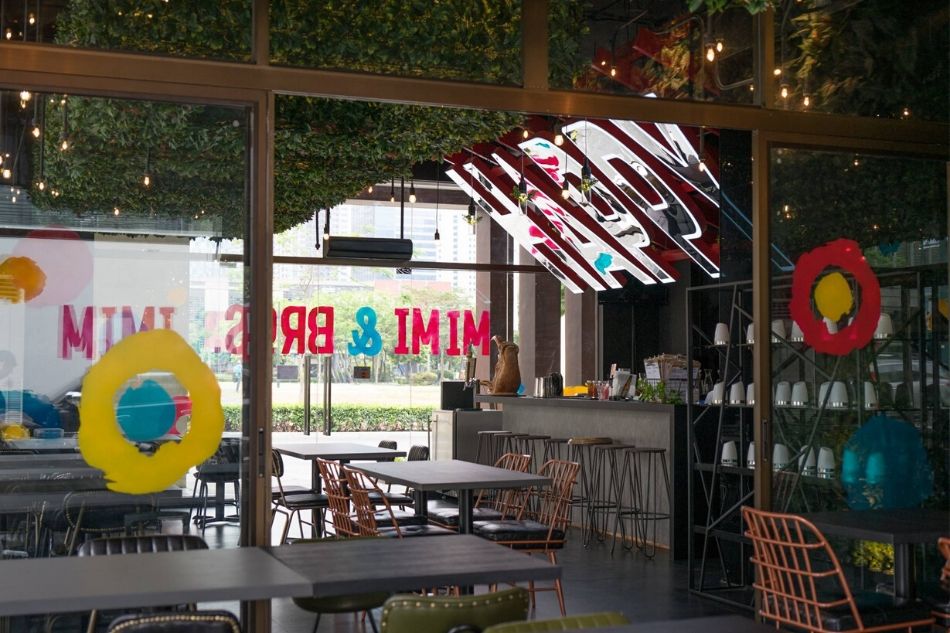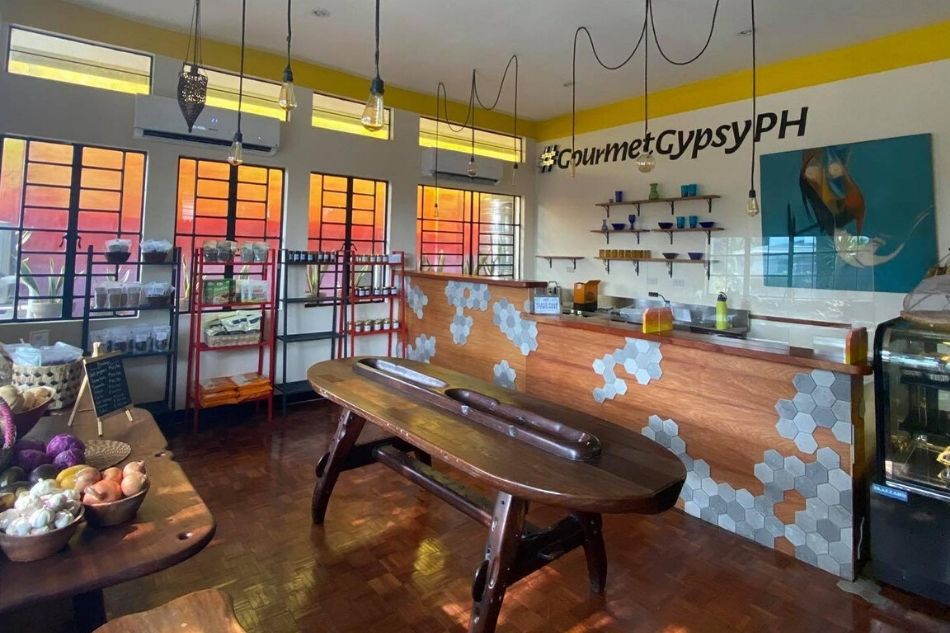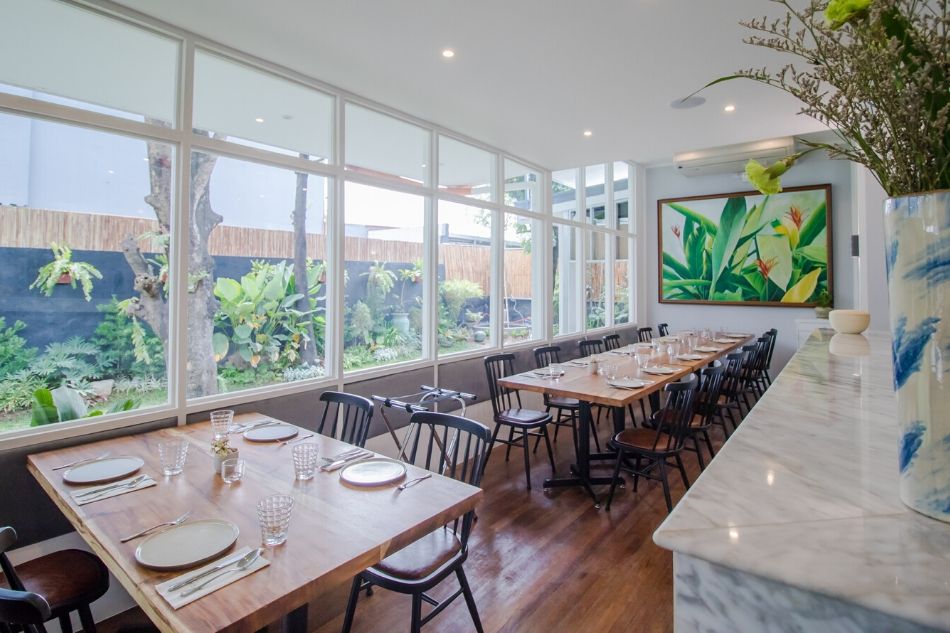Why these restaurateurs will never look at the dining business the same way after COVID
ADVERTISEMENT

Welcome, Kapamilya! We use cookies to improve your browsing experience. Continuing to use this site means you agree to our use of cookies. Tell me more!
Why these restaurateurs will never look at the dining business the same way after COVID
ANCX
Published May 26, 2020 07:17 PM PHT
|
Updated May 27, 2020 03:13 AM PHT
“When can we dine again?” was both the title and question posed during the premiere episode of The ANCX Forum, ANCX’s new web-based roundtable that tackles issues related to the current pandemic. It was a fitting question to ask about the restaurant industry which has been one of the sectors most decimated by the lockdown. With prominent restaurants around the world shutting down, it is clear that the road to recovery for many restaurants is an uncertain one.
“When can we dine again?” was both the title and question posed during the premiere episode of The ANCX Forum, ANCX’s new web-based roundtable that tackles issues related to the current pandemic. It was a fitting question to ask about the restaurant industry which has been one of the sectors most decimated by the lockdown. With prominent restaurants around the world shutting down, it is clear that the road to recovery for many restaurants is an uncertain one.
Aired last May 21 on ANCX’s Facebook page, the forum invited restaurateurs Chef Myke “Tatung” Sarthou, Elbert Cuenca, Chef Waya Araos-Wijangco, and “Marketman” Joel Binamira, along with guest appearances by Chef Edward Bugia and Chris Evans of Zomato Philippines, to share their insights.
Aired last May 21 on ANCX’s Facebook page, the forum invited restaurateurs Chef Myke “Tatung” Sarthou, Elbert Cuenca, Chef Waya Araos-Wijangco, and “Marketman” Joel Binamira, along with guest appearances by Chef Edward Bugia and Chris Evans of Zomato Philippines, to share their insights.
Hosted by Ces Oreña-Drilon and moderated by JJ Yulo, the forum was a fascinating hour-and-a-half-long discussion that veered from pragmatism to high emotion, with a few tears along the way, as the participants offered honest, raw takes on the toll the pandemic has taken on their businesses. During a break in the discussion, JJ Yulo asked if the four panelists ever cried during this period, and all four didn’t hesitate to say “yes” they did when they had to face their staff with the hard news.
Hosted by Ces Oreña-Drilon and moderated by JJ Yulo, the forum was a fascinating hour-and-a-half-long discussion that veered from pragmatism to high emotion, with a few tears along the way, as the participants offered honest, raw takes on the toll the pandemic has taken on their businesses. During a break in the discussion, JJ Yulo asked if the four panelists ever cried during this period, and all four didn’t hesitate to say “yes” they did when they had to face their staff with the hard news.
From dire predictions to hopes and plans for the future, the panelists shared the following seven key takeaways:
From dire predictions to hopes and plans for the future, the panelists shared the following seven key takeaways:
ADVERTISEMENT
1. A projected 20% up to even 60% of restaurants could shut down.
1. A projected 20% up to even 60% of restaurants could shut down.
For a bit of perspective, Chris Evans, Country Head of restaurant app Zomato Philippines, revealed that among the 24,000 Metro Manila-based restaurants listed on Zomato, only 15% restaurants are currently open for takeaway and delivery, with 85% remaining closed. He further projected, “Many restaurants in Metro Manila will not be able to reopen, or will be able to reopen, but probably will not be able to survive on the other side of this crisis. This is a global feeling with many projections being anywhere from 40% to 80% restaurants reopening.”
For a bit of perspective, Chris Evans, Country Head of restaurant app Zomato Philippines, revealed that among the 24,000 Metro Manila-based restaurants listed on Zomato, only 15% restaurants are currently open for takeaway and delivery, with 85% remaining closed. He further projected, “Many restaurants in Metro Manila will not be able to reopen, or will be able to reopen, but probably will not be able to survive on the other side of this crisis. This is a global feeling with many projections being anywhere from 40% to 80% restaurants reopening.”
Zubuchon owner Joel Binamira polled his followers on his Instagram account @therealmarketman on their post-lockdown dining habits. Out of 1,100 responses, 88.8% of respondents said they wouldn’t be dining out in the next 3 to 4 months minimum. Binamira shared, “Nobody really tells you what happens when 80% of business shuts down.”
Zubuchon owner Joel Binamira polled his followers on his Instagram account @therealmarketman on their post-lockdown dining habits. Out of 1,100 responses, 88.8% of respondents said they wouldn’t be dining out in the next 3 to 4 months minimum. Binamira shared, “Nobody really tells you what happens when 80% of business shuts down.”
2. The smaller players may be more vulnerable, but the bigger players are in trouble too.
2. The smaller players may be more vulnerable, but the bigger players are in trouble too.
Chef Myke “Tatung” Sarthou has kept his restaurants, Tatung The Garden Café and Pandan Asian Café, closed, opting for a conservative wait-and-see approach. “We can just go bankrupt in a month’s time if we do the wrong thing… We can’t be reckless in our actions,” he explained. That’s because smaller, independent restaurants like his don’t necessarily have the deep pockets to sustain them through a shutdown. Turning visibly emotional, Sarthou implored, “All my friends, all the people I love in the industry are in this circle… You’re afraid not just for the future, you’re afraid for what’s going on right now.”
Chef Myke “Tatung” Sarthou has kept his restaurants, Tatung The Garden Café and Pandan Asian Café, closed, opting for a conservative wait-and-see approach. “We can just go bankrupt in a month’s time if we do the wrong thing… We can’t be reckless in our actions,” he explained. That’s because smaller, independent restaurants like his don’t necessarily have the deep pockets to sustain them through a shutdown. Turning visibly emotional, Sarthou implored, “All my friends, all the people I love in the industry are in this circle… You’re afraid not just for the future, you’re afraid for what’s going on right now.”
While Sarthou lamented the plight of the smaller establishments, Binamira warned that even the bigger ones, many of which are highly leveraged and tied down with multiple branches in malls, are in trouble. “Actually, the big guys, they’re going to fall pretty hard, too,” he predicted.
While Sarthou lamented the plight of the smaller establishments, Binamira warned that even the bigger ones, many of which are highly leveraged and tied down with multiple branches in malls, are in trouble. “Actually, the big guys, they’re going to fall pretty hard, too,” he predicted.
ADVERTISEMENT
3. New government regulations could further burden restaurants.
3. New government regulations could further burden restaurants.
With quarantine restrictions slowly relaxing, restaurants will sooner or later open up for dine in, but with a host of new regulations to comply with, from sanitation to social distancing. And that requires investment. The owner of Gourmet Gypsy Art Café, Chef Waya Araos-Wijangco worried, “We really cannot afford all the requirements that are being demanded of by the government.” She added, “They (the government) need to support us, not just penalize us if the guidelines they put forth are not followed.”
With quarantine restrictions slowly relaxing, restaurants will sooner or later open up for dine in, but with a host of new regulations to comply with, from sanitation to social distancing. And that requires investment. The owner of Gourmet Gypsy Art Café, Chef Waya Araos-Wijangco worried, “We really cannot afford all the requirements that are being demanded of by the government.” She added, “They (the government) need to support us, not just penalize us if the guidelines they put forth are not followed.”
4. Supporting staff is the priority.
4. Supporting staff is the priority.
One thing that the crisis has shown is the increased importance restaurateurs place on supporting their staff. Chef Edward Bugia addresses this in his restaurants Pino, Pipino, Breakfast & Pies, and Mimi & Bros, advising, “Make sure that everyone is still able to get to work. For those who cannot go to work, it’s ok, you don’t have to really force them. We have to be more understanding, especially now, we have to weather the storm.”
One thing that the crisis has shown is the increased importance restaurateurs place on supporting their staff. Chef Edward Bugia addresses this in his restaurants Pino, Pipino, Breakfast & Pies, and Mimi & Bros, advising, “Make sure that everyone is still able to get to work. For those who cannot go to work, it’s ok, you don’t have to really force them. We have to be more understanding, especially now, we have to weather the storm.”
For Elbert Cuenca, his restaurants Elbert’s Steak Room, Elbert’s Diner, Elbert’s Upstairs Bar, Elbert’s Pizzeria, and Metronome have always been about the customer experience. But now, Cuenca realized, “Rather than just thinking of our customers, we’re now thinking about our staff first and foremost. How do we keep things alive for them?” He added, “It’s become family first. We take care of each other.”
For Elbert Cuenca, his restaurants Elbert’s Steak Room, Elbert’s Diner, Elbert’s Upstairs Bar, Elbert’s Pizzeria, and Metronome have always been about the customer experience. But now, Cuenca realized, “Rather than just thinking of our customers, we’re now thinking about our staff first and foremost. How do we keep things alive for them?” He added, “It’s become family first. We take care of each other.”
Looking at the broader picture, Wijangco lamented that thousands of restaurant workers have lost their jobs, and stressed, “We need to price our products in a way that we can pay our staff fairly, and protect them when things like this happen.”
Looking at the broader picture, Wijangco lamented that thousands of restaurant workers have lost their jobs, and stressed, “We need to price our products in a way that we can pay our staff fairly, and protect them when things like this happen.”
5. A solid concept, customer insight, and a pragmatic approach are needed to survive.
5. A solid concept, customer insight, and a pragmatic approach are needed to survive.
Forget Instagram-pretty interiors or a popular or mall-based location, according to Cuenca. “People are choosing based on what they really want, not on what’s uso,” he declared. Regarding the current success of Elbert’s Pizzeria, he shared, “Just by luck, it turns out to be the perfect pandemic food. It’s portable, you don’t need cutlery or plates, you can take it out, deliver it anywhere.” The lesson here is to observe what customers want. “You’re really going to have to examine customer behavior,” Cuenca added.
Forget Instagram-pretty interiors or a popular or mall-based location, according to Cuenca. “People are choosing based on what they really want, not on what’s uso,” he declared. Regarding the current success of Elbert’s Pizzeria, he shared, “Just by luck, it turns out to be the perfect pandemic food. It’s portable, you don’t need cutlery or plates, you can take it out, deliver it anywhere.” The lesson here is to observe what customers want. “You’re really going to have to examine customer behavior,” Cuenca added.
ADVERTISEMENT
On her end, Wijangco transformed Gourmet Gypsy into a grocery concept that’s safe and stress free. “We’re creating a different kind of experience,” she explained, and one that her customers are looking for.
On her end, Wijangco transformed Gourmet Gypsy into a grocery concept that’s safe and stress free. “We’re creating a different kind of experience,” she explained, and one that her customers are looking for.
Using the analogy of a pit of quicksand, Binamira cautioned not to plunge into new concepts out of sheer desperation or one might end up sinking to the bottom. He explained “People need to act based on fact, based on financial projection, on reality, rather than their stress that’s pushing things along.”
Using the analogy of a pit of quicksand, Binamira cautioned not to plunge into new concepts out of sheer desperation or one might end up sinking to the bottom. He explained “People need to act based on fact, based on financial projection, on reality, rather than their stress that’s pushing things along.”
6. Restaurants will come back, adapted to the times, but stronger than ever.
6. Restaurants will come back, adapted to the times, but stronger than ever.
Zomato’s Chris Evans predicted, “Over time new businesses will replace those businesses shutting down, even if it takes 12 to 24 months.” Binamira agreed, “Restaurants are going to come back and they’re going to come back strong.” Sarthou acknowledged that as well, grinning, “Mas gigil kumain sa labas ang mga tao.”
Zomato’s Chris Evans predicted, “Over time new businesses will replace those businesses shutting down, even if it takes 12 to 24 months.” Binamira agreed, “Restaurants are going to come back and they’re going to come back strong.” Sarthou acknowledged that as well, grinning, “Mas gigil kumain sa labas ang mga tao.”
There are new opportunities and technologies to be explored, and the investment costs won’t be as high, believes Cuenca. “You will find out that you don’t need the location, location, location. It’s a thing of the past, that’s gone,” he added. As proof of that, Chef Waya shared, “Someone snapped up my Roces branch within the hour when it closed!”
There are new opportunities and technologies to be explored, and the investment costs won’t be as high, believes Cuenca. “You will find out that you don’t need the location, location, location. It’s a thing of the past, that’s gone,” he added. As proof of that, Chef Waya shared, “Someone snapped up my Roces branch within the hour when it closed!”
You may also like:
You may also like:
7. We need to envision a kinder, more humane restaurant industry.
7. We need to envision a kinder, more humane restaurant industry.
When restaurants come back, the panelists joked, “Wala nang influencers!” But in all seriousness, Cuenca put it succinctly, “We’ve come to realize that this is a people business. This is a business where we care for each other.” And for Wijangco, it really is more than just a business. “It’s putting humanity in the food, in everything we do.” Still fresh from a long stint feeding hospital frontliners, she shared, “The generosity and kindness that flowed through us and that we were able to give to others was overwhelming. And that gives me hope that there’s still kindness in the world.”
When restaurants come back, the panelists joked, “Wala nang influencers!” But in all seriousness, Cuenca put it succinctly, “We’ve come to realize that this is a people business. This is a business where we care for each other.” And for Wijangco, it really is more than just a business. “It’s putting humanity in the food, in everything we do.” Still fresh from a long stint feeding hospital frontliners, she shared, “The generosity and kindness that flowed through us and that we were able to give to others was overwhelming. And that gives me hope that there’s still kindness in the world.”
Joel Binamira photo courtesy of Metro Channel
Elbert Cuenca photo by Pat Mateo
Elbert’s Pizzeria photo by Jar Concengco
Talisay The Garden Café photo by Paulo Antonio Valenzuela
ADVERTISEMENT
ADVERTISEMENT











